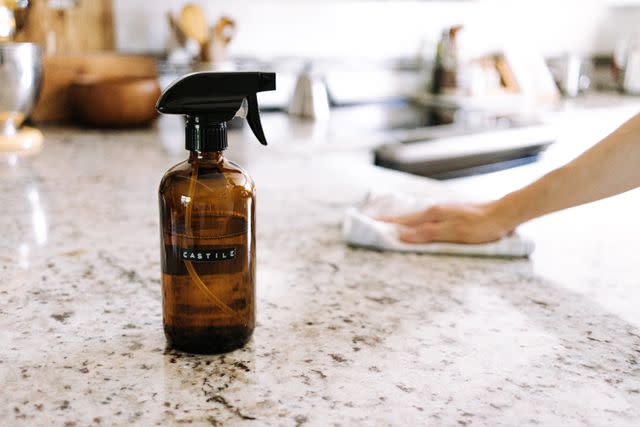What Is Castile Soap, and Should You Use It to Clean Your Home?
:max_bytes(150000):strip_icc():format(jpeg)/use-castile-soap-to-clean-house-1707114-02-a548cd3aedca48239af68208700c7bfd.jpg)
The Spruce / Jorge Gamboa
Castile soap, available in liquid or bar form, is a multi-purpose cleaner made from vegetable oils. Containing no harsh chemicals, this gentle cleaner can be used for bathing, in the laundry room, and to clean many surfaces in your home.
Learn more about Castile soap and how you can use it for a cleaner home.
What Is Castile Soap?
Named for the soapmaking Castile region of Spain where it was developed, Castile soap originated centuries ago. Castile soap is made from plant-based oils, often a combination of olive, coconut, palm, hemp, walnut, or avocado, so it is vegan, non-toxic, and biodegradable.
Because of Castile soap's gentle, plant-based ingredients, this soap is commonly used all around the home and body for different purposes, from skincare to laundry to whole-home cleaning—even pest control.
Castile Soap Uses

The Spruce / Jorge Gamboa
Castile soap is used as a home cleaner and in body care products like shampoo and body wash. It is a commonly used ingredient when making DIY laundry detergent.
While it is often used alone when combined with other products like rubbing alcohol or baking soda, Castile soap becomes a key ingredient in other DIY products like:
All-purpose cleaner: In a spray bottle, combine 1 cup of distilled water, 1 tablespoon of unscented liquid Castile soap, and 10 to 15 drops of essential oil.
Floor cleaner: In a large bucket, combine 2 gallons of warm water, 1 cup of isopropyl (rubbing) alcohol, 1/2 teaspoon liquid Castile soap.
Window cleaner: In a spray bottle, combine 2 drops of liquid Castile soap, 1 cup isopropyl alcohol, and 1 cup distilled water.
Dishwashing soap: Add 3-4 drops of liquid Castile soap to a sink of hot water.
Wool wash or gentle laundry detergent: In a large bowl, combine 4 cups of grated Castile bar soap flakes, 4 cups of boiling water, 1 cup of denatured alcohol, and 1 tablespoon of essential oil for fragrance (optional). Stir until well combined and store in a resealable container. To use, rub a small amount into stains and add 1 tablespoon to a sink of lukewarm water.
Toilet bowl cleaner: Combine 2 cups baking soda, 1/2 cup powdered citric acid, and 1/2 teaspoon liquid Castile soap in an air-tight container. To use, add one tablespoon of the powder to the toilet bowl. Scrub the bowl with a toilet brush and then add 1.2 cup vinegar. Scrub again and flush.
Fruit and vegetable cleaner: Add 1-2 drops of liquid Castile soap to a sink of cool water.
Hair and body wash: Combine one tablespoon of liquid Castile soap with one cup of warm water for bathing or shampooing hair.
Benefits of Using Castile Soap
Because Castile soap is made from vegetable oils, it is vegan, does not contain harsh chemicals, is non-toxic, and is biodegradable. The soap is hypoallergenic and safe to use on pets.
Both the bar and liquid soaps are highly concentrated and should be diluted before use. Since a little bit goes a long way, it is more affordable than cleaners that are sold with a high content of water.
Castile Soap vs. Other Soaps
Most bar soaps contain animal fats, synthetic dyes, and chemical fragrances. Depending on the brand, some commercial liquid and bar soaps may also contain other synthetic ingredients like parabens, phthalates, and BPAs (Bisphenol A, a chemical used primarily in the production of polycarbonate plastics). Castile soap is made from plant-based oils which are non-toxic and biodegradable.
Frequently Asked Questions
What is the difference between Castile soap and regular soap?
Castile soap contains only plant-based oils and most other soaps contain animal fats and, often, synthetic ingredients like dyes and fragrances.
What are the disadvantages of Castile soap?
Since Castile soap has a high fat content from plant-based oils, it can be difficult to rinse away and leave soap scum especially when used in hard water areas. As an alkaline soap, it should not be combined with acids like vinegar and lemon juice. However, these gentle acids will rinse away any soapy residue that remains on surfaces. The alkaline properties of Castile soap also make it unfriendly to plants.
What is the main ingredient in Castile soap?
Liquid and bar Castile soaps are made from plant-based oils, often a combination of olive, coconut, palm, hemp, walnut, or avocado oil.
Read the original article on The Spruce.

